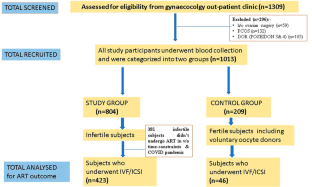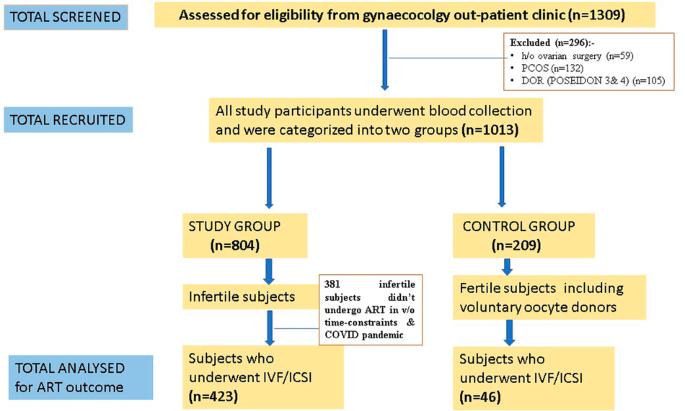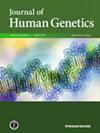Prevalence of FSH-R Asn680Ser and Ala307Thr receptor polymorphism and their correlation with ART outcomes among infertile Indian-Asian women-a prospective cohort study
IF 2.6
3区 生物学
Q2 GENETICS & HEREDITY
引用次数: 0
Abstract
The present prospective cohort study evaluated the prevalence of FSH-R receptor Asn680Ser and Ala307Thr among infertile Indian women and the correlation of these polymorphisms with ART outcomes. Total 804 infertile and 209 fertile controls were enrolled for FSH-R analysis. Correlation of different genotypes with ovarian reserve markers, IVF parameters, and cumulative live birth rates (CLBR) was done among women undergoing IVF. In fertile controls, at 680 position GG (Ser/Ser) was the most common genotype; but among infertile women, all the genotypes were equally distributed. There was no significant difference in ovarian response parameters, oocyte yield, and CLBR among the three genotype groups. Empty follicle syndrome (EFS) was highest in women with AA or AG type at both positions. On categorisation of unexpected poor responders according to POSEIDON stratification; GG genotype at both positions had the lowest risk ratio of low-oocyte yield in ART cycles, but these differences were not statistically significant. This is the largest study from Indian ethnicity showing GG (Ser/Ser) genotype is most common among fertile women. The effect of FSH-R genotypes is very marginal on IVF parameters and is not reflected in CLBR. More prospective data may be required on the correlation of these genotypes with genuine EFS, thus stratifying the next cycles with self or donor oocytes. Routine genetic testing of FSH-R polymorphism should not be done except in a research setting. As both 680 and 307 positions are in linkage disequilibrium, only 680 position analysis may be done in a research setting.


印度-亚洲不孕妇女中 FSH-R Asn680Ser 和 Ala307Thr 受体多态性的发生率及其与抗逆转录病毒疗法结果的相关性--一项前瞻性队列研究。
本前瞻性队列研究评估了印度不孕妇女中FSH-R受体Asn680Ser和Ala307Thr的患病率以及这些多态性与抗逆转录病毒疗法结果的相关性。共有 804 名不孕妇女和 209 名已育对照妇女接受了 FSH-R 分析。在接受体外受精的妇女中,不同基因型与卵巢储备标志物、体外受精参数和累积活产率(CLBR)之间存在相关性。在可育对照组中,680 位 GG(Ser/Ser)是最常见的基因型;但在不育妇女中,所有基因型的分布均等。三个基因型组的卵巢反应参数、卵母细胞产量和CLBR没有明显差异。空卵泡综合征(EFS)在两个位置均为AA或AG型的妇女中发病率最高。根据 POSEIDON 分层法对意外反应差者进行分类,两个位置均为 GG 基因型的妇女在 ART 周期中出现低卵母细胞产量的风险比最低,但这些差异在统计学上并不显著。这是印度人种中规模最大的一项研究,结果表明 GG(Ser/Ser)基因型在育龄妇女中最为常见。FSH-R基因型对试管婴儿参数的影响很小,在CLBR中也没有反映出来。可能需要更多关于这些基因型与真正 EFS 的相关性的前瞻性数据,从而对使用自体或供体卵母细胞的下一个周期进行分层。除非在研究环境中,否则不应进行 FSH-R 多态性的常规基因检测。由于 680 位和 307 位都存在连锁不平衡,因此在研究环境中只能对 680 位进行分析。
本文章由计算机程序翻译,如有差异,请以英文原文为准。
求助全文
约1分钟内获得全文
求助全文
来源期刊

Journal of Human Genetics
生物-遗传学
CiteScore
7.20
自引率
0.00%
发文量
101
审稿时长
4-8 weeks
期刊介绍:
The Journal of Human Genetics is an international journal publishing articles on human genetics, including medical genetics and human genome analysis. It covers all aspects of human genetics, including molecular genetics, clinical genetics, behavioral genetics, immunogenetics, pharmacogenomics, population genetics, functional genomics, epigenetics, genetic counseling and gene therapy.
Articles on the following areas are especially welcome: genetic factors of monogenic and complex disorders, genome-wide association studies, genetic epidemiology, cancer genetics, personal genomics, genotype-phenotype relationships and genome diversity.
 求助内容:
求助内容: 应助结果提醒方式:
应助结果提醒方式:


